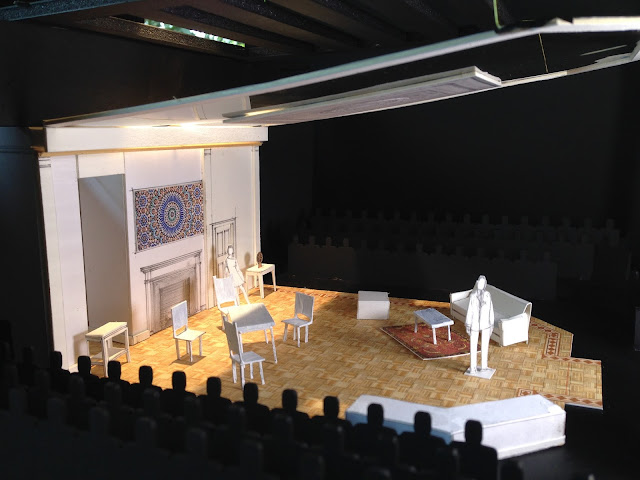 |
| Ayad Akhtar |
by
Jacqueline E. Lawton
Dramaturg
Ayad Akhtar is a storyteller. By profession, he is an actor, a playwright, a novelist and a filmmaker. He studied theatre and religion in college. He was drawn to the ways that theatre offered audiences a form of ritual and a way to experience different narratives and cultures. In a recent article with
HowlRound, Akhtar explains:
As a fundamentally religious person the theater appeals to me; we gather together in a room and we experience something that actually happens in front of us. You can do something in the theater that you cannot in any other art form and that is to reveal the face of the divine in a way, to reveal the collective energy of some source that unifies us all.
Through his writing, Akhtar explores the experience of faith and cultural identity.
Disgraced examines the challenges and complexity of identity and questions the place of faith in today’s world. Through the character of Amir, we navigate the social and cultural expectations of race, religion, and ethnicity. In doing so, the play asks us to question who we are and who we want to be against the expectations of family, friends and colleagues.
Drawing from his own life and experience, Akhtar examines what it means to be Muslim in the U.S. His parents both came from Pakistan and he was raised in a secular household in Wisconsin. While Akhtar had a period of devoutness, he struggled with his cultural and religious identity. He broke away from and reawakened to his own faith. He is now a practicing Sufi and defines himself as a cultural Muslim. In Disgraced, through the character of Amir, we become intimately familiar with the struggle of what it means to be Muslim in a post-9/11 society.
 |
| Portrait of Juan de Pareja by Velázquez |
Race and colonialism are also critical to Akhtar’s exploration of that world as an artist. By positioning Muslim characters in the central role of his work, he allows his audience to consider the Islamic experience as relevant as the Christian or Jewish experiences of America. While never seen on stage, Diego Velázquez’s Portrait of Juan de Pareja plays a pivotal role in the play. It anchors the narrative around cultural identity, colonialism, exoticism of the other, and cultural assimilation. Interestingly, Juan de Pareja’s story mirrors Amir’s hopes, ambitions and desire to obtain the American Dream:
Juan de Pareja was a Spanish painter born into slavery. He was of Moorish descent. He learned to paint by observing his master
 |
| Vocation of Saint Matthew by Juan de Pareja |
Diego Velázquez, a leading artist of great renown in the Spanish court of King Philip IV. Pareja practiced his own craft in secret. He worked diligently and waited for the opportunity to showcase his work. According to legend, that day came when the King paid Velázquez a visit. Pareja placed one of his own paintings where he knew the King would see it. When the King entered, Pareja risked life and limb and threw himself at the King's feet. He explained that he had learned to paint in secret and begged the King for his help. On seeing the great work of art, the King replied, “any man who has this skill cannot be a slave." And with that, Velázquez had no choice, but to grant Pareja his freedom.
Amir, a Pakistani American lawyer, endeavors to become a partner at his law firm. He wants his name on the wall alongside those of his Jewish colleagues. If obtained, such an achievement would grant him a solid foothold in the American Dream. It would be an affirmation of his talent, skill and intelligence. It would exempt him from being perceived as a second class citizen. Unfortunately, for Amir and for many whose racial, religious and cultural identities mark them as other, this freedom will never be.
Like religion, theatre can also offer a space for healing. Theatre achieves its impact through the act of empathy and the process of catharsis (or what we might call emotional purgation). In an article with
HowlRound, Akhtar explains:
Catharsis is only possible when the full dimension of our pity and our terror are aroused by what we see. If the volume dials down to two or three you can’t really have catharsis. Catharsis isn’t about feeling sorry for a character or shedding a few tears. It is a very specific process having to do with identification, anticipation, pity, and terror.
In the spring, our community was rocked with tragedy. An inexplicable act of violence took the young and inspiring lives of Deah Shaddy Barakat, Yusor Mohammad Abu-Salha and Razan Mohammad Abu-Salha. Since the shootings, many students, staff, faculty and community members have looked for ways to honor the lives and legacies of these young people. For instance, an interactive project called “After the Shooting” was created to allow users to learn more about issues related to mental health, gun control, the impact of the media, and the role of religion in society. At PlayMakers Repertory Company, we offer this production of
Disgraced as a space to come together as a community, to examine ourselves, to challenge our assumptions, and to find a way forward through our differences.
Join us for
Disgraced. Onstage through October 4th.
Click here or call our Box Office at 919-962-7529 for tickets.













